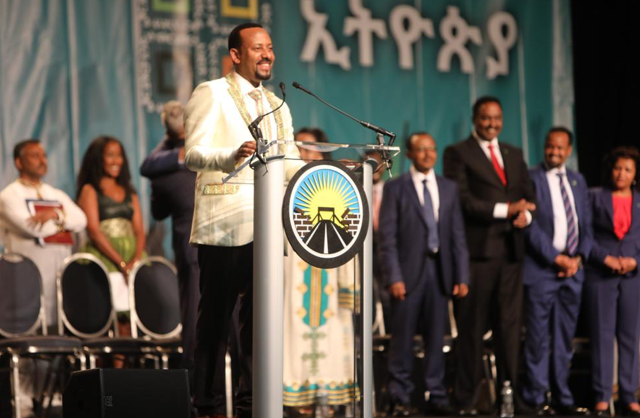 PM Abiy Ahmed addresses a public gathering at the Walter E. Washington Convention Center in Washington, DC on July 28th, 2018. (Photo: Matt Andrea for Tadias Magazine)
PM Abiy Ahmed addresses a public gathering at the Walter E. Washington Convention Center in Washington, DC on July 28th, 2018. (Photo: Matt Andrea for Tadias Magazine)
Tadias Magazine
By Tadias Staff
Published: December 26th, 2018
New York (TADIAS) – As we close the year with our annual photo highlight of some the biggest stories featured on Tadias our 2018 spotlights include PM Abiy Ahmed’s visit to the U.S. last July; his appointment of a new gender balanced cabinet in October comprising of an unprecedented 50% women members; the recent naming of Ms. Sahle-Work Zewde, a former senior United Nations official, as Ethiopia’s first female President; the selection of Meaza Ashenafi, a former women’s rights lawyer, as the President of Ethiopia’s Supreme Court; and the appointment of Birtukan Mideksa; a former judge and opposition leader, as the new head of Ethiopia’s Election Board.
In all respects this has been nothing short of an incredible year in Ethiopian history. Who would have thought that in a matter of months Ethiopia would transform itself and inspire optimism for good governance, democracy and peace amid ongoing uncertainty and conflict around the world?
Imagine this for a moment: This is the first holiday season ever in our life time, and certainly since we launched Tadias in 2003, that we go to sleep knowing that not a single of our journalist colleagues are spending the night in prison in Ethiopia. That’s a remarkable change from our standpoint, and a much needed and timely recognition that an independent and professional media sector is the backbone of a free and democratic society. As the Washington Post’s new motto reminds us, without an independent media
“Democracy Dies in Darkness.”
2018 also marked the 15th anniversary of the founding of Tadias. As always, we look forward to many more years of service and wish you all a Happy New Year!
PM Abiy Ahmed’s U.S. Tour
PM Abiy Ahmed visited the United States in July 2018 meeting with members of the Ethiopian Diaspora community in Washington D.C., Los Angeles and Minneapolis. During his successful three-city tour PM Abiy also met with religious leaders and took part in the peace and reconciliation conference in DC between the exiled synod of the Ethiopian Orthodox Tewahedo Church and the synod in Ethiopia. The churches were reunited after almost three decades of separation. Read more and see photos »
Former UN Official Sahle-Work Zewde Becomes Ethiopia’s First Female President
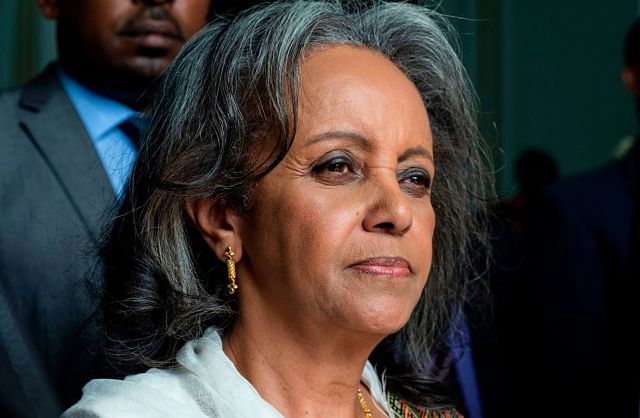
Sahle-Work Zewde leaves Parliament after being elected as Ethiopia’s first female president, in Addis Ababa on Oct. 25, 2018. (Getty Images)
On October 25th, 2018 Ambassador Sahle-Work Zewde was approved by parliament to become Ethiopia’s first female president. Previously Sahle-Work was Special Representative of United Nations Secretary-General António Guterres to the African Union and Head of the United Nations Office to the African Union at the level of Under-Secretary-General of the United Nations. According to her bio Sahle-Work was born in Addis Ababa and educated at Lycée Guebre-Mariam. She later attended the University of Montpellier in France where she majored in natural science. She speaks fluent Amharic, French, and English. A former employee of the Ethiopian foreign service, Sahle-Work served as Ethiopia’s top diplomat in Senegal, Mali, Cape Verde, Guinea-Bissau, Gambia, Guinea, Djibouti and France before joining the United Nations. In remarks to Parliament after she took her oath of office as Ethiopia’s new President, Sahle-Work emphasized the importance of respecting women and the need to build a “society that rejects the oppression of women.” She also promised to work for peace and unity in the country.
Ethiopia Swears In First Woman Supreme Court Chief
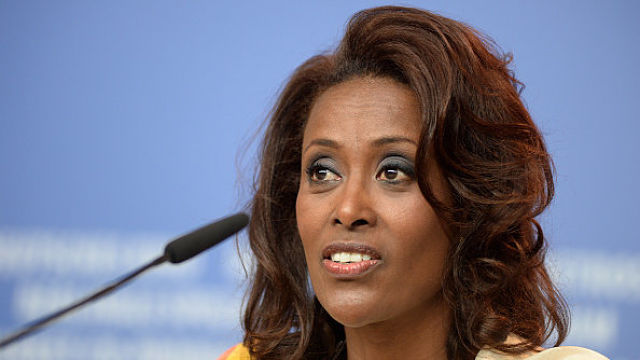
Meaza Ashenafi is Ethiopia’s first female Supreme Court chief appointed to senior government positions by reformist Prime Minister Abiy Ahmed. (Getty Images)
Meaza Ashenafi, a former women’s rights lawyer, was sworn in as Ethiopia’s first female Supreme Court President on Thursday, November 1st, 2018. Formerly Meaza was a judge on the High Court from 1989 to 1992 and adviser for the UN Economic Commission for Africa. She was also the founder of the Ethiopian Women Lawyers Association as well Enat Bank, Ethiopia’s first women’s bank. Meaza’s work became best known in the international legal community following her successful court case in Ethiopia that resulted in an end to the tradition of kidnapping girls and forcing them to marry. Per NPR: “The case sparked debate over the issue throughout the country and became the subject of the 2014 film “Difret,” executive produced by Angelina Jolie. According to Reuters Abiy said that he nominated Meaza “with the firm belief that she has the capacity required, with her vast international experience in mind.” The nomination was unanimously approved by parliament.
Birtukan Mideksa Named New Head of Ethiopia’s Election Board
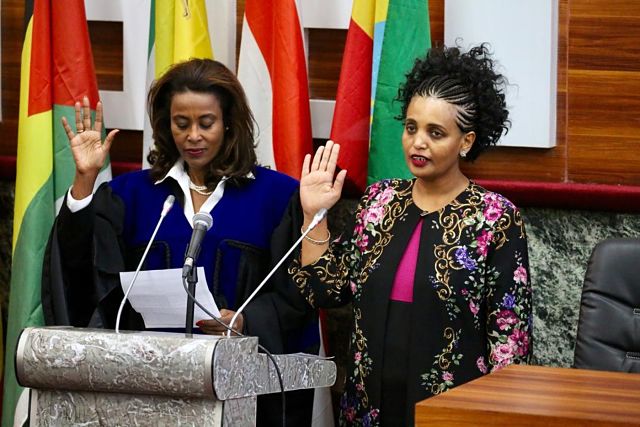
Birtukan Mideksa is sworn in as the new head of Ethiopia’s Election Board on November 22nd, 2018. (Photo: FBC)
Birtukan Mideksa, a former judge and leading opposition figure, was sworn in as the head of Ethiopia’s election board on November 22nd, 2018. “Birtukan is the most senior ex-opposition figure to assume a high government post in Ethiopia in recent history,” the Associated Press noted. “She is also the latest of several women appointed to high-profile posts in Prime Minister Abiy Ahmed’s new administration.” Birtukan was one of several former opposition leaders that had met with Abiy briefly during his U.S. tour over the past summer. “Conducting a democratic election comes first, then winning comes next,” Abiy told lawmakers as he appointed Birtukan as election board head. “Conducting free and fair elections is the cornerstone for a democratic system. We all have to stand firm so that the next election will not be rigged.”
In PM Abiy’s New Cabinet, Half the Ministers are Women
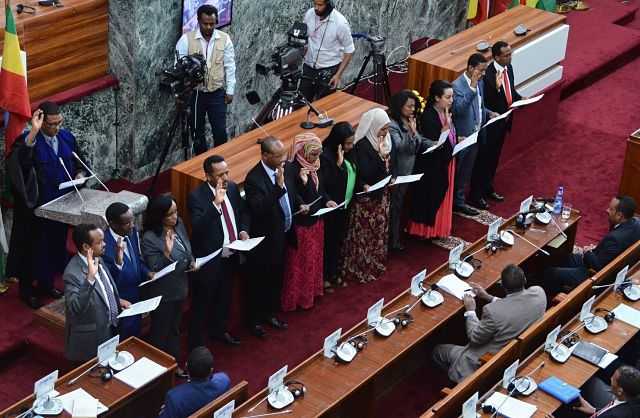
Ethiopia’s newly appointed ministers take their oath of office on Tuesday, October 16, 2018 at the parliament in the capital Addis Ababa. (Getty Images)
On Tuesday, October 16th Ethiopia once again surprised the world when PM Abiy Ahmed presented to Parliament’s approval his newest set of government ministers made up of 50% women members, which is unheard of in many countries around the globe. The Washington Post’s Paul Schemm noted that the landmark announcement was “an unprecedented push for gender parity in Africa’s second-most-populous nation.” Schemm continued: “The new cabinet, which reduces ministerial positions from 28 to 20, has women in the top security posts for the first time in Ethiopia’s history. Aisha Mohammed will be in charge of defense, and Muferiat Kamil, a former parliamentary speaker, will head the newly formed Ministry of Peace.” Read more »
Abune Merkorios, Ethiopia’s 4th Patriarch, Returns Home After 27 Years in Exile
Nothing signaled more clearly the dawning of a new era in Ethiopia than the return this past summer of Abune Merkorios, Ethiopia’s 4th Patriarch, to his home country after 27 years in exile. Abune Merkorios arrived in Addis Ababa on Wednesday August 1st, 2018 following a peace and reconciliation agreement that ended the nearly three-decade-old separation between the exiled synod of the Ethiopian Orthodox Tewahedo Church and the synod in Ethiopia. The exiled patriarch was welcomed home with a memorable state reception at Addis Ababa airport, which was televised live.
Ethiopia-Eritrea Reopen Border for First Time in 20 Years
On Ethiopian New Year’s day on September 11, 2018 Ethiopia and Eritrea re-opened their borders for the first time in two decades “cementing a stunning reconciliation and giving Addis Ababa a direct route to its former foe’s Red Sea ports,” Reuters pointed out. “Thousands of people from both countries watched one ceremony in Zalambessa, an Ethiopian border town that was reduced to rubble soon after hostilities between the neighbors broke out in 1998.” The news report added: “Soldiers and civilians waving Ethiopian and Eritrean flags lined the road as Ethiopian Prime Minister Abiy Ahmed and Eritrean President Isaias Afwerki opened the frontier in a ceremony broadcast live on Ethiopian state TV. “This is the happiest day of my life,” Ruta Haddis, an Eritrean from the town of Senafe just across the frontier, told reporters. “I never thought this would take place in my lifetime.” The war over their border and other issues killed an estimated 80,000 people before fighting ended in 2000 in a contested peace deal. Tensions burned on over the position of the frontier – until Abiy offered to end the military standoff this year as part of a package of reforms that have reshaped the political landscape in the Horn of Africa and beyond.”
The Battle Over Ethiopia’s Meqdela Treasures
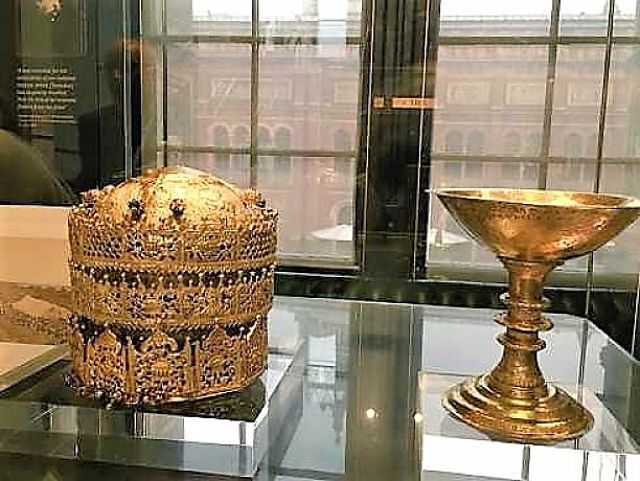
A gold crown and a gold chalice (both 1735-40) are among the many rare Ethiopian historical items looted from the treasury of Emperor Tewodros II following his death during the Battle of Meqdela with British forces in April 1868. (Photo: FBC)
In April an international controversy was ignited in the UK concerning Ethiopia’s looted Meqdela treasures when the Victoria and Albert Museum (V&A) in London announced an uncanny proposition to loan Ethiopia the items on a long term contract. V&A’s Director was quoted as saying: “They would be sent to Ethiopia on long-term loan, so ownership would remain with the museum.” The answer is “a quick no,” replied the Ethiopian Ambassador to England, emphasizing that Ethiopia is the rightful owner of the items. “My government is not interested in loans, it is interested in having those objects returned.” The announcement from V&A came in conjunction with the museum’s exhibition featuring its Meqdela collection on the 150th anniversary of the battle. According to The Art Newspaper, among the nearly two dozen objects featured at the V&A show included “a priestly gold crown, a gold chalice (both 1735-40), several processional crosses and imperial jewelry” that were forcefully removed from Ethiopia. The Ethiopian government is asking for restitution of the country’s looted treasures that are being held at various locations in the United Kingdom.
The Ethiopian Diaspora Trust Fund Launches Website for Donations
The Ethiopian Diaspora Trust Fund holding a press conference at the Ethiopian Embassy in Washington, DC on Saturday, December 1st, 2018. (Photo by Matt Andrea for Tadias)
The Ethiopian Diaspora Trust Fund (EDTF) started accepting donations through its website on October 22nd, 2018. The fund’s advisory council members have been tasked to mobilize the nearly 3 million global Ethiopian Diaspora community to donate at least one dollar a day ($365/year) expected to generate about a billion dollars on a yearly basis to benefit economic and other development projects in Ethiopia. The fund, which is incorporated as a 501(c)(3) non-profit organization, allows donors to make tax-deductible contributions. You can learn more about EDTF and donate at ethiopiatrustfund.org »
Eskinder Nega Makes a Surprise Appearance at the 2018 PEN America Literary Gala in New York
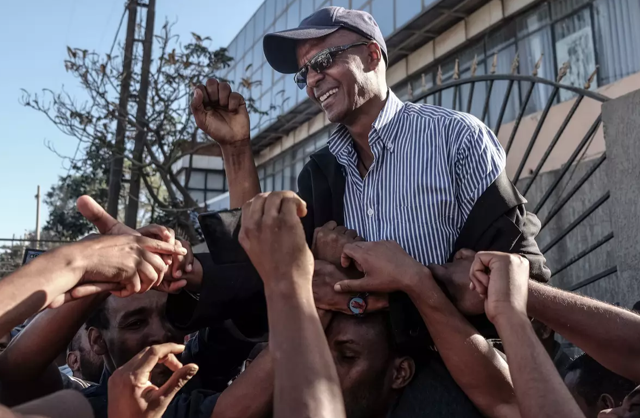
Journalist Eskinder Nega was released on February 14, 2018, after serving nearly seven years in prison. (Photo: Getty Images/Yonas Tadesse)
Last but not least one of our favorite social justice advocates, journalist Eskinder Nega, who is a former prisoner of conscience, made a surprise appearance at the 2018 PEN Literary Gala in New York City on May 22nd, 2018. Eskinder came to New York to personally thank the organization for the prestigious “Freedom to Write” award that was given to him in absentia six years ago when he was still serving an 18-year prison sentence in Ethiopia on wildly fabricated charges stemming from his work as a journalist. Eskinder Nega was released on February 14, 2018, after serving nearly seven years behind bars. “In the prize I received from PEN America, I see the solidarity of the free to the unfree,” Eskinder said in brief remarks at the event, which was held at the American Museum of Natural History in Manhattan. “I see the triumph of our common humanity over our differences. I see our common destiny, which is that of freedom for all humanity.” Among the well known writers who attended the event included Ethiopian American novelist Dinaw Mengestu who was recently named by The New York Times among 32 black male writers of our time.
—
Related:
The 10 Best Tadias Arts & Culture Stories of 2017 in Pictures
2016 in Pictures
15 Arts & Culture Stories of 2016 in Photos
2015 in Pictures
Ten Arts & Culture Stories of 2015
2014 in Pictures
Ten Arts & Culture Stories of 2014
2013 in Pictures
Top 10 Stories of 2013
Ten Arts and Culture Stories of 2013
Join the conversation on Twitter and Facebook.

























